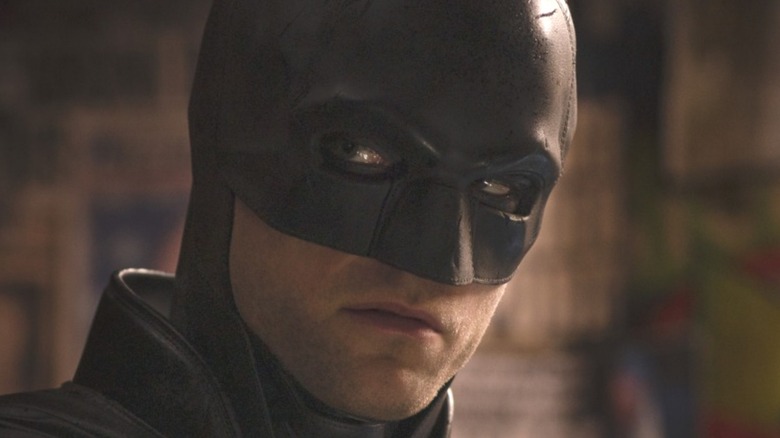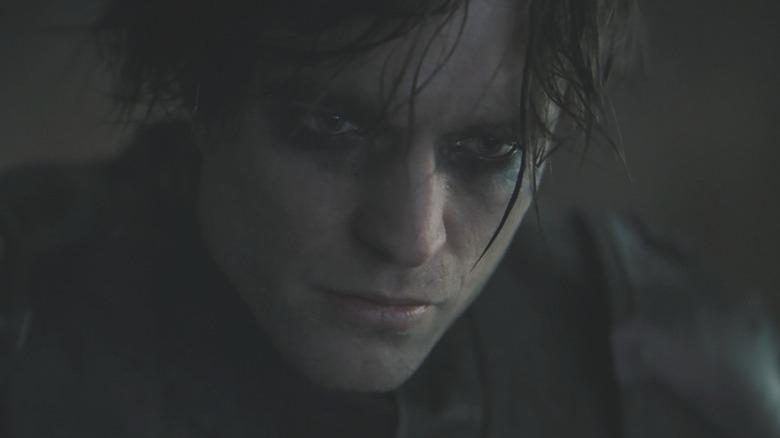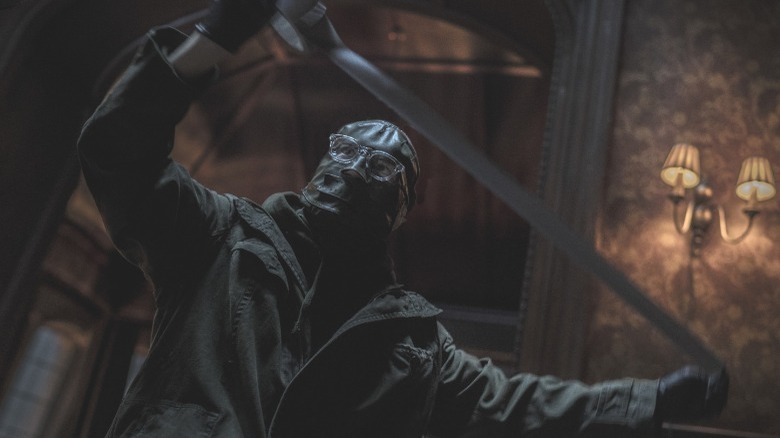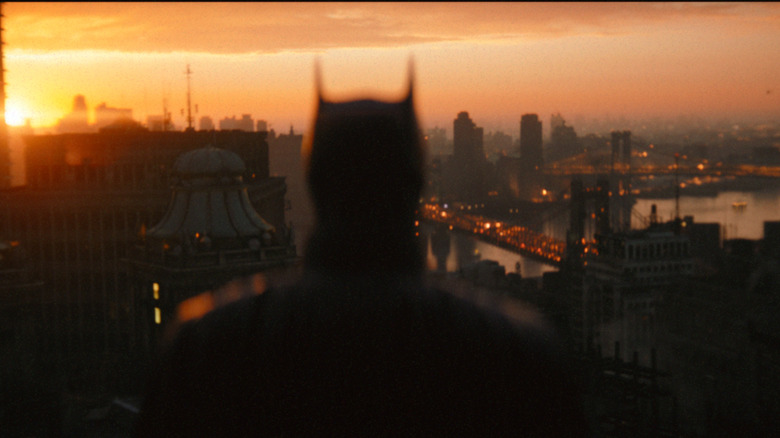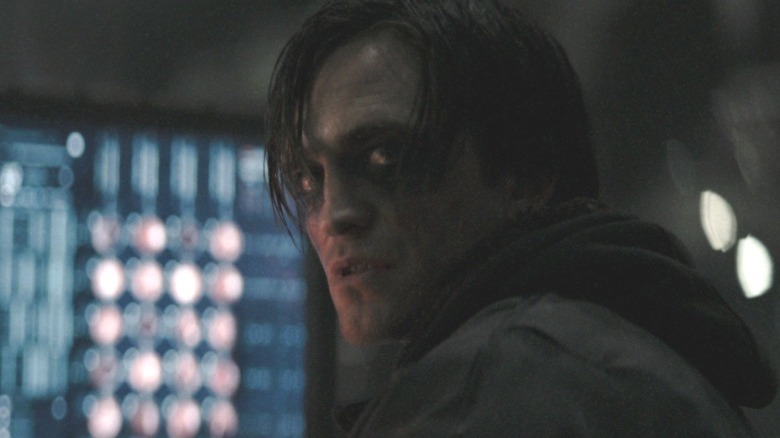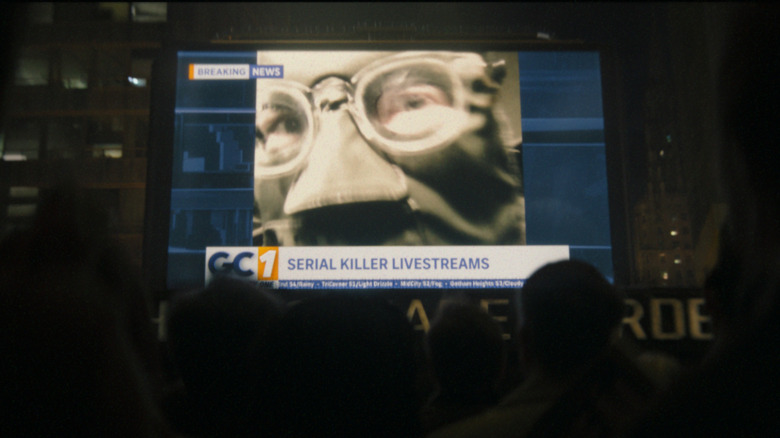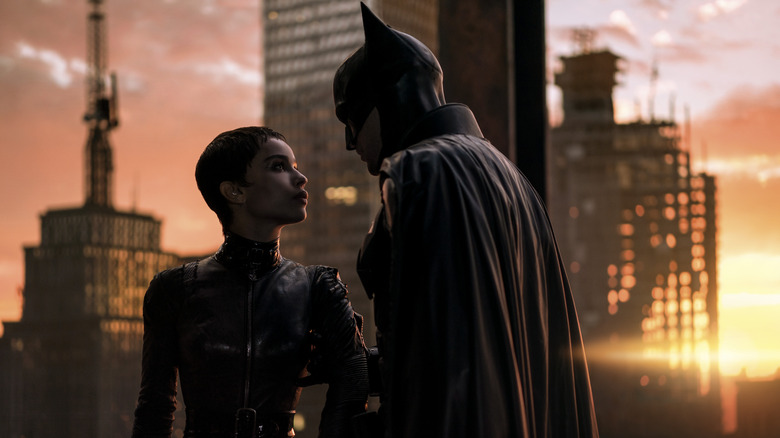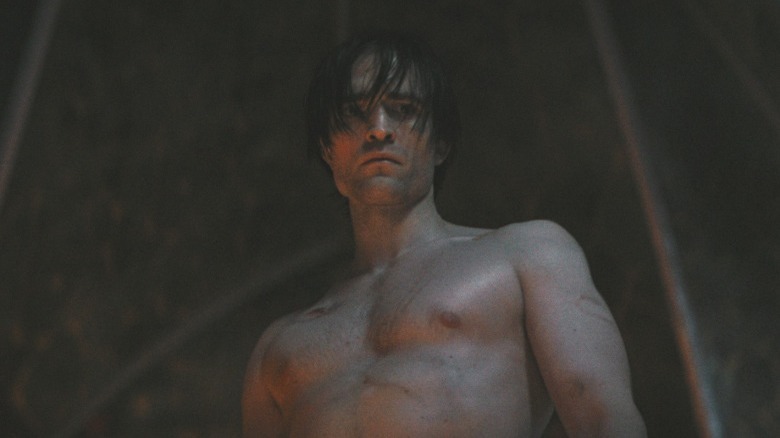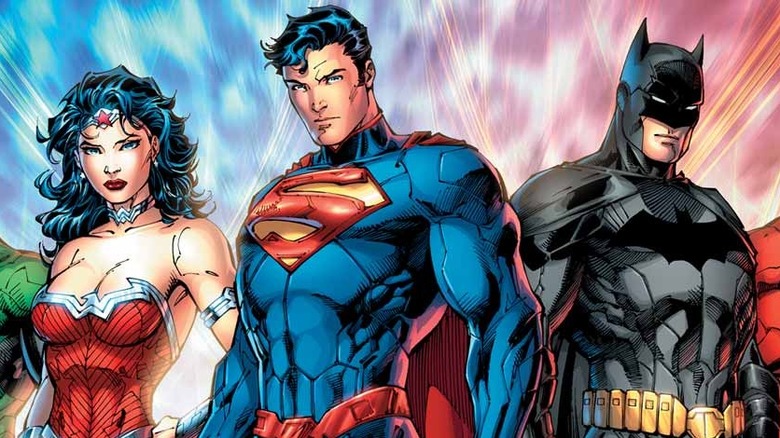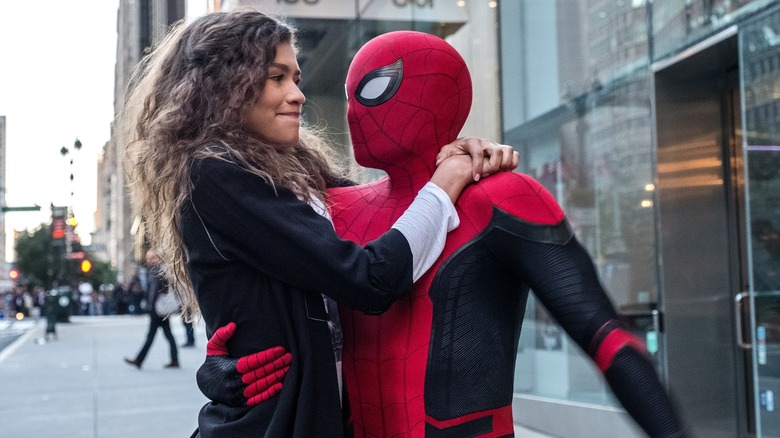Things Only Adults Notice In The Batman
As one of the most popular fictional characters in human history, Batman never totally disappears from popular culture. Between 2016's "Batman v Superman: Dawn of Justice," 2017's "Justice League," and 2021's reedited version titled "Zack Snyder's Justice League," billionaire Bruce Wayne and his cowl-clad alter ego appear in quite a few recent movies. However, technically, Hollywood hasn't cranked out a solo live-action Batman film since 2012's "The Dark Knight Rises" — and a movie with Batman in it is simply not the same thing as a Batman movie.
Directed by Matt Reeves, 2022's "The Batman" is not an origin story, but it picks up with a Batman (Robert Pattinson) who's relatively new to the gig, and not yet the impossibly competent living legend seen in previous films. In the process of hunting a serial killer known as the Riddler (Paul Dano), Bruce falls for a remarkably athletic waitress named Selina Kyle (Zoë Kravitz), and stumbles upon a decades-old conspiracy involving municipal corruption, organized crime, and his father's urban renewal foundation.
Is there stuff in "The Batman" that only older folks will understand and appreciate? We think so! Let's take a look...
This Batman has a touch of Alan Moore in his voiceover
At the onset of "The Batman," we see an armed robbery and an attempted subway mugging on a rainy Gotham evening. A voiceover from the eponymous Caped Crusader waxes philosophical about his war on the criminal element. "They think I'm hiding in the shadows ... but I am the shadows," he explains.
For some, Batman's brooding tone and delivery may call to mind Rorschach's inner monologue from the opening of "Watchmen" — the 1986 series by Moore and artist Dave Gibbons oft-credited with paving the way for "grimdark" superhero stories, which was adapted into a 2009 film by director Zack Snyder.
Moore and Gibbons didn't invent hardboiled detectives who engage in foreboding interior conversations — that trope dates back to the late 1920s. However, the parallels between Rorschach — or the archetype he represents — and this Batman don't end with the beginnings of their stories.
Like Batman, Rorschach is a masked vigilante who keeps a journal loaded with phrases like "This city's afraid of me; I've seen its true face." But unlike most cinematic iterations of Batman, Rorschach has zero qualms about murdering criminals, and his sense of morality leaves no room for gray areas.
It's possible Matt Reeves and the writing team intended Batman's voiceover as a deliberate homage to Moore and Gibbons's essential superhero deconstruction. There's some Rorschach in Batman, but there's also some Rorschach in the Riddler as well. And in their use of voiceover, they may all owe something to "Double Indemnity."
The Batman spends its only f-word on a holiday greeting
According to widely accepted notions about the Motion Picture Association's ratings system, a PG-13 movie may contain exactly one use of the infamous f-word. Any more f-bombs than that kick the film up to an R rating, preventing unaccompanied minors from buying tickets and potentially damaging the box office takeaway, especially for a major superhero blockbuster like "The Batman."
Generally, superhero movies don't bother cursing at all or dive headfirst into full-blown R-rated territory, but "The Batman" walks the line. Since the film has a single precious "f***" to give, you might expect to hear it during an intense emotional moment. That's not what happens.
Early in the movie, Batman and the Gotham City Police Department (GCPD) investigate the scene surrounding the Riddler's murder of Mayor Don Mitchell, Jr. (Rupert Penry-Jones). Observing that it happens to be October 31st, Commissioner Pete Savage (Alex Ferns) turns to the Dark Knight and mockingly wishes him a "Happy F***ing Halloween!"
It's as if "The Batman" picks up its one and only f-bomb and casually tosses it aside, just to get it out of the way. This film knows it doesn't really need to swear, but that doesn't mean it will let a perfectly good f-bomb go to waste.
This Gotham is NYC meets Gotham from Batman: Year One
Considering DC has been publishing new Batman stories on a constant basis since the late 1930s, it's pretty wild how filmmakers keep returning to Frank Miller and David Mazzucchelli's "Batman: Year One" from 1987 for inspiration. There are certainly many other Batman comics that could easily be movies, but Hollywood really loves "Year One," apparently. Heck, who can blame 'em? "Year One" is pretty great!
The barebones premise of "Year One" — in which Batman gets the hang of being Batman and befriends detective James Gordon — provides the partial foundation for 2005's "Batman Begins." However, "The Batman" also borrows from Miller and Mazzucchelli, while managing to avoid retreading director Christopher Nolan's earlier reboot.
Fiercely protective of her friends and more interested in targeting corrupt elites than thievery for its own sake, Zoë Kravitz's Selina has more in common with the Catwoman of "Year One" than any prior onscreen take on the character. Meanwhile, the Gotham City of "The Batman" – excluding an abrasive downtown that's a clear stand-in for Times Square — resembles Mazzucchelli's worn-down, overdeveloped Gotham that recalls the New York City of the '70s and '80s.
This Batman makes mistakes -- which makes him relatable
He writes terrible goth poetry; he's mean to his surrogate parent; he has inherited responsibilities he wants nothing to do with. Does that sound like the greatest superhero of all time, or a self-involved, privileged teenager? If Bruce Wayne was real, don't you think he'd come off as an angry, arrogant jerk?
Dismissed as an "emo brat" by a New York Times critic who doesn't like this movie, Pattinson's Bruce Wayne is one of the more explicitly flawed takes on The World's Greatest Detective we've seen committed to screen. He's dismissive toward the ever-loyal Alfred Pennyworth (Andy Serkis) and alienates Selina before the end of their first reconnaissance mission. Batman wants everyone to fear him, but cops and Penguin flunkies alike all laugh right in his ridiculous face. At one point, Batman bungles a major clue; at another, a daring rooftop escape ends in a humiliating crash landing.
Batman-related media has a habit of telling us Batman is a normal guy with no superpowers, while showing us a character who via top-tier deductive capacities and an unlimited supply of gadgetry might as well be considered as omnipotent as his Kryptonian BFF. Meanwhile, "The Batman" offers us a Dark Knight who actually is a normal guy with a ton of personality defects, who is also bad at things he tries to do sometimes. He's still got a lot of money, but there's nothing godlike about this Bat. He comes across as ... dare we say ... human?!
The Riddler has definitely seen the films Saw and Seven
Sometimes in superhero movie discourse, folks will use the terms "dark" and "realistic" interchangeably. This is wrong, and "The Batman" demonstrates why.
Compared to Frank Gorshin's definitive performance in the 1966 "Batman" TV series and Jim Carrey's banana-sauce take from 1995's "Batman Forever," the Riddler from "The Batman" is far, far darker. Aside from the traditional practice of dispensing riddles to Batman and the GCPD to make his crime sprees more interesting, he has little in common with his predecessors. This Riddler is much more murderous than the Riddlers of yore, to the great misfortune of several Gotham City public servants.
Paul Dano's Riddler demonstrates tendencies likely meant as homages to other films — his booby trap and rat maze-oriented executions of Commissioner Savage and District Attorney Gil Colson (Peter Sarsgaard) instantly call to mind "Saw" and its affiliated series of torture romps. When Batman and the GCPD raid Riddler's apartment, his piles of journals promptly harken to John Doe's apartment in "Seven." Riddler even turns himself over to the authorities, just like John Doe (Kevin Spacey) in David Fincher's 1995 crime-horror masterpiece.
This Riddler is darker, but he is not more realistic. We know this because John Doe and Jigsaw from "Saw" are also imaginary characters. They are just as unlikely to exist in the real world as a bank robber who taunts authorities with gimmicky, silly clues and dresses up in a green tuxedo covered in question marks.
Batman is uptight about sex work
It's probably not realistic to expect the main character in a major studio blockbuster that's got to appeal to conservative Midwesterners to express what socially liberal folks would consider an enlightened attitude about sex work. Still, Batman doesn't think twice about grilling Selina — a woman he barely knows — about the possibility that she might have done some escort gigs while employed at the Iceberg Lounge. At one point, Selina reluctantly reveals that Carmine Falcone (John Turturro) is her father, not her customer, because it's the only way to get Batman off her freakin' back about it.
But let's consider the counterfactual scenario. What if Carmine was Selina's client? What if Selina had a whole bunch of former johns? Does Batman bring her to jail at that point? Is it any of Batman's business at all?
There's definitely a chauvinistic and judgmental component to Bruce's initial attitude towards Selina, which is to be expected — as we've noted, this in a more immature Batman than we're used to; he's been sheltered and insulated by insane amounts of wealth his whole life. Still, you'd think a guy who runs around in a form-fitting animal-themed outfit wouldn't be this close-minded.
Robert Pattinson's diet for this movie was completely unnecessary
From the sound of things, Robert Pattinson had a hard time maintaining his extraordinarily fit character's physical appearance. The expectation these days is everybody who plays a superhero has to compete with Jason Momoa's abs, which is no minor task.
"You just cut down and cut down and cut down before the couple of scenes with your shirt off, and you're counting sips of water," he told People in a red carpet interview before "The Batman" premiere screening.
Pattinson deserves some kudos for using his eccentric megastar platform to indirectly address the unrealistic body images projected by superhero movies. In addition, if he's grumpy about all the ruthless dieting and exercise he might have been contractually obligated to do for this movie, that's pretty reasonable.
At one point in "The Batman," Bruce Wayne takes his shirt off while examining a massive chart of clues and evidence. Batman's reasons for not wanting a shirt in this moment are never explained. Does not wearing a shirt make Batman think better? Is it an unnaturally warm early November day? We'll never know. As far as we can tell, there's no logical reason for Bruce to take his shirt off in this movie at all. Pattinson probably missed out on lots of cake and pizza for nothing. Let Batman have a piece of cake, Warner Bros. You monsters.
This Gotham is too realistic for Superman or Wonder Woman
At this moment in superhero movie history, we just saw three versions of Spider-Man from different eras join forces in 2021's "Spider-Man: No Way Home," we might be on the cusp of Professor Charles Xavier joining the MCU after decades as the licensed property of a different movie studio, and Michael Keaton is returning to fold his series of decades-old Batman movies into the DCEU in 2022's "The Flash."
As seemingly all the other superhero franchises — including other Batman timelines — lean into the science fiction aspects of their source materials to cultivate fan service and corporate synergy, this version of Gotham City feels way too grounded for any of that wacky nonsense. Not only are there no references to other DC characters, "The Batman" doesn't even have quasi-fantastic elements like the high-speed military tank Batmobile or the League of Shadows from the Christopher Nolan trilogy — the previous standard setter for "gritty realism" in Batman movies.
Who the heck knows what DC has planned, but if ninjas are too magic-adjacent for this Batman, let's not expect to see him hanging out with Kryptonians, Amazon Princesses, intergalactic peacekeepers, or folks who can run through time.
Maybe a recently orphaned kid with world-class acrobatic chops might be close enough to real-world plausibility for this series?
This might be the least MCU-ish superhero movie since 2008
To some extent since 2008's "Iron Man," and to a much greater extent since 2012's "The Avengers," basically every superhero movie is either on the trajectory towards a big honkin' team-up, about a big honkin' team-up, or dealing with the aftermath of a big honkin' team-up. Almost all of these films take place in a shared universe that includes a bunch of other films. Many superheroes talk as if they're being written by someone hired to mimic Joss Whedon's style circa the early 2010s; even the ones who don't — and that includes denizens of the "adult" and "serious" comic book movies — tell tons of friggin' jokes.
"The Batman" is not funny. The only other movie it indirectly advertises is its own yet-to-be-officially greenlit sequel. "The Batman" only introduces one surprise character from the comics who isn't in the trailers. There's not even much in the way of obvious potential for toy licensing in this movie.
Despite its arguably messy execution of too much story, "The Batman" feels like an emphatic step away from the MCU paradigm. Assuming it's the first movie in a series, hopefully it carries on in that direction. The MCU's good and fine, but we already have one of those. We also already have a DC cinematic universe that very much wishes it was the MCU. Maybe "The Batman" will be the start of a third thing.
